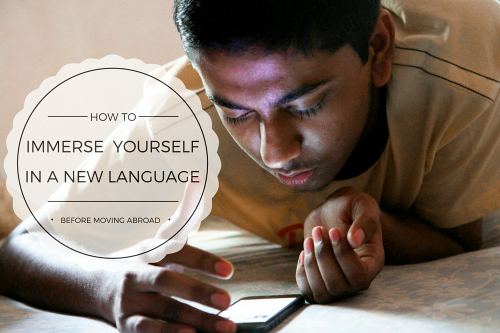Learning a language can be one of the most daunting things an adult can do. As children we are able to quickly pick up on subtle rules of grammar and a whole dictionary of vocabulary without too much effort. But as we get older our brains find it hard to make new connections and increasingly work in whichever language we use the most.That’s not to say it’s impossible to pick up Portuguese, or become fluent in Flemish. It’s possible to spend vast amounts on formal lessons, audio lessons and expert tuition, but studies show that the only way to really learn is to dive into the language. Two hours a week of intense teaching can only do so much if the rest of the week is spent speaking with the mother tongue.
Immersion in your chosen language means you are living in it, constantly finding new ways of using it, adapting it to your needs. No amount of conjugating verbs in stuffy classrooms can match a few minutes of lively conversation or following the action of a movie in a foreign language.
Anyone moving abroad should have a basic grasp of the national language. Not only does it help with day-to-day tasks, but even in countries with high fluency in English it is good form to know a few words of the local lingo. To help expats brush up on their Bulgarian or polish their Polish, we’ve compiled tips on how to immerse yourself in your target language.
Start thinking
We hope you are doing this already, but try doing it in the language you are trying to learn. You don’t need to say things out loud for your brain to start making the link between ‘the cat’ and ‘el gato’.
Everybody spends part of their day having silent conversations with themselves. This internal monologue may be as simple as writing a mental shopping list or as intense as a running commentary of everything they see and do. Whatever is buzzing through your mind, do as much of it in the language you are learning as possible.
Eventually you will be able to switch between tongues with ease, thinking in one language as fast as you can think in the other. Be strict with yourself as you get better and better by making sure your inner conversation uses the correct tense, gender and grammar. You’ll already know what you mean, but sticking to the rules when practising means your spoken conversation will feel more natural.
Download an app
Even if you are going down the classroom and tutoring route, there’s a teacher you can carry in your pocket. Apps for smart phones are usually free to download and can be a great way to practise in between lessons.
The best apps will be structured to keep introducing new material whilst revising old stuff. As well as introducing words and phrases, the apps will help you with pronunciation, sentence structure and little bits of etiquette.
As well as notes to read on screen, many apps will include games to play and recordings to listen to, forcing you to shake your brain awake and use what you’ve learned in a variety of ways. You may even find yourself chatting away to imaginary friends as the app asks you to speak into your microphone so it can analyse pronunciation.
The best thing about apps is their portability; any moment stuck on the train or waiting in line can become an impromptu lesson. You can be sat with a coffee learning the difference between ‘café negro’ and ‘café con leche’.
Obviously immersing yourself in a language doesn’t mean you can conduct every aspect of your life in the new language, especially when you’re still living and working in your home country. So make sure to set aside moments in the day when you can quickly open an app to revise or play a game.
Talk to yourself
Once you’ve got into the habit of thinking in the new language, try talking to yourself. It’s not as crazy as it sounds: you may be pronouncing words perfectly in your head but actually wrapping your lips around strange sounds can be a challenge.
Many European languages share a common root, sharing grammar rules and even exact words. But even in these related languages there can be unique sounds that the learner just hasn’t made before. German has a range of soft vowels that take practice to produce, and the harsh throaty tones of modern Arabic require experience.
If needed, stand in front of a mirror and watch the shape or your lips when reciting troublesome words, this will give a greater sense of what works.
Some oriental languages rely on subtle, nuanced pronunciation of words and regular rhythms. Changing the stress on a syllable in one word may change the meaning of the entire sentence. Say these lines out loud and record yourself, listening back to see if you’re making sense.
Carry notes
Carry a set of cards in your pocket, or a notebook, or a pick stack of sticky labels. Make note of any phrases you will need early on, such as ‘where is the hotel,’ or ‘how do I say…”, then use the note to revise as you go on. Write the question in English, then your target language and then phonetically underneath. Read the cards, remember them and keep adding to them.

Before you know it you’ll have practised the phrases that give you trouble to perfection. Remember to focus on phrases that help you get better at the language, ask the locals how you say something, or get them to speak slower, ban yourself from using the phrase ’do you speak English?’
Identify household objects whose name you can’t translate and then label them. After boiling ‘la bouilloire’ a few times you’ll quickly associate the word with a nice cup of ‘thé’. This technique works well for inanimate objects, but less well for people and animals.
Change your settings
This could be an elaborate practical joke, sneakily swapping the setting on someone’s phone so the device operates in an entirely different language. But this can be an ace tip for those with a grasp of the basics, forcing them to operate technology in the target language.
If you’re heading overseas to work, you’ll encounter phones, laptops, ticket machines and all kinds of fancy gadgets that operate in a language that is not your own. Of course most of these can also be adjusted to work in English, but you might have to navigate through several confusing menus in a foreign language to be able to change it.

Instead get used to working in the new language, especially where technology is concerned. Get used to dealing with pop-ups and warning notifications, fixing printers and tweaking programs in your adopted lingo. This will save embarrassing calls to the IT department at work as you’ll be able to understand what the little grey boxes say in that strange fusion of techno and normal language.
Another great tip is to download a plugin for your Internet browser that automatically translates websites into another language. These tools can be a little hit-and-miss in terms of accuracy, but it’s another useful technique for diving into your chosen dialect.
Go on holiday
A growing number of expat employers are forking out for their staff to visit their new homes ahead of the big move. It’s a great chance for the kids to see their future school, to arrange shipping of furniture and to size up the new home.
Use this as a dress rehearsal for your language skills; try out what you’ve learned by meeting the neighbours or negotiating the city asking for directions. It’s the only opportunity you have to see if your version of the language fits your destination. Anyone moving to Argentina can get by with European Spanish, but they should at least know that the Argentinians like to keep things formal.
If you can’t swing by the future neighbourhood, try a quick break to somewhere that speaks the same language. If you can’t afford to check out your Brazilian home, try swinging by Portugal. Although the dialects won’t be a perfect match you will at least get some practise with your expanded vocabulary and realise how much you have learnt. Use the trip to build your confidence as much as a your competence.
Read the news
This trick works in two ways: firstly it’s a great way of getting used to the semi-formal language used in newspapers and in work documents.
Secondly, this is a great way of easing yourself into the culture of your new home. You’ll arrive clued up on politics, sport and celebrity gossip, and even if this doesn’t directly affect you it will lessen the culture shock and homesickness.
Search for both national and local newspapers for your area and check back regularly to keep up to date on the gossip happening in your neighbourhood. It may also be worthwhile investigating expat news sources which explain events in detail for outsiders and give warning of stories that impact foreign residents.
Read books
Reading newspapers will keep you in the loop, but this can help you disconnect and chill out. Once you’re up to a certain level, hit the library and start reading fiction.
Paperbacks of bestsellers are usually pretty cheap to source in a variety of languages or easily exchanged if you’ve got friends also reading in the language. Alternatively, be on the lookout for ebooks and digital copies of translations.

Bestsellers and paperback fiction usually have a fairly simple standard of writing and should be well translated, making it easy for you to push into new vocabulary with confidence.
If spy thrillers and romance novels are still a little out of reach, don’t be afraid of exploring the children’s section. Teen fiction isn’t all that bad, and series like Twilight and Harry Potter should keep readers interested through books that get progressively more advanced.
For the absolute beginner, try short stories or comic books, especially in their original language. Revel in reading Tintin in the original French or revise kanji with some Japanese manga.
Watch movies
Every country has its own films. Some may be as famous as French arthouse or Indian Bollywood, while others like Norwegian crime-noir may enjoy a small cult following.
Whatever your taste in films, sitting down with a DVD is a great way of testing your language skills whilst enjoying some culture. Create some ambience with a bottle of the local specialty and a serving of the national dish, then turn the lights down and try to keep up with the action.
Obviously this may present issues for the novice linguist, so switch on subtitles to something you are familiar with and refer to them only when you can’t make out what’s being said.
Talk to a native
All the apps, classes, books and gadgets in the world can’t replace a good chat with a native speaker.
The way languages are taught can get you through an exam, but it might be a very different version from the words spoken on the street. Talking to someone whose natural dialect is the one you are trying to learn means you’ll hear the words in action at full tilt rather than slowed down for a learner.

You’ll also encounter a regional accent, slang and swear words that aren’t in the dictionary. Very quickly, you’ll begin to get an understanding of how appropriate formal and informal tenses work in the real world and how to greet friends or colleagues.
Learning a language is one thing, but being able to use it a realistic way is something you can only get from someone who has lived in a culture. You may know how to say hello to the boss in Japanese, but do you know how deeply to bow to subordinates?
Finding friends from your destination country might not be easy, so be on the lookout for cultural groups who meet near you. Larger cities are filled with small pockets of people from around the world who may have regular meetups and would be only too pleased to meet someone heading to their home.
If you can’t find anyone close to you, hit the internet. You may be able to return the favour, using video calls to chat to someone trying to learn English. Not only will you be better equipped linguistically when you eventually arrive, you’ll also have a friend waiting for you.
Do you have any tips for people who are looking to learn a language? Add your thoughts in the comments!
Article by Andy Scofield, Expat Focus International Features Writer

